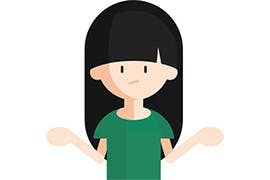What's Causing the Headache in the Back of Your Head?
After a long day at work, the last thing you want to deal with is pain in the back of your head. If you’re suffering from a headache, you’re not alone—almost everyone experiences headaches at some point.1 There are different types of headaches, but the main characteristic of a headache is a throbbing, constant, sharp or dull pain in your head or face. Pain in the back of your head can be caused by a tension or migraine headache. Learn what’s causing headaches in the back of your head and how to find relief from your symptoms.
Tension Headaches
One of the potential causes of the pain in the back of your head is a tension headache. Tension headaches are usually caused by everyday stressors, making them the most common type of headache. Typically, tension headaches cause a steady, dull ache that can be felt on both sides of the head.2 Symptoms that are more severe such as throbbing or pulsating pain, nausea, vomiting and sensitivity to light are often associated with migraines instead of tension headaches.3
What Causes Tension Headaches?
It’s hard to pinpoint the exact reason behind tension headaches. You might notice yourself getting a tension headache after a stressful or tense day. Other causes can include muscle contractions in the head and neck, your genetics and your environment.2
What Are the Symptoms of a Tension Headache?
The most common symptoms of a tension headache can include:2
- Pain that comes on slowly
- Pain in and around the back part of the head or neck
- Tension on both sides of the head
- Dull pain or a feeling like there’s a band or vice around the head
- Mild to moderate pain
Migraine Headaches
Migraine headaches aren’t as common as tension headaches, but the pain tends to be much more severe. While anyone can experience a migraine, they are two to three times more common in women than men. Like tension headaches, genetics can also play a part in determining who gets migraines—seventy percent of migraine sufferers have one or more family members who also experience migraines.3
What Causes Migraine Headaches?
People who are prone to migraines usually have specific triggers that can set off their symptoms. Some of the most common migraine triggers include:3
- Rising humidity and heat levels
- Lack of sleep or oversleeping
- Fatigue
- Emotional upset
- Stress
- Sensory triggers including bright or flickering lights, loud noises or strong smells
- Certain foods, alcohol or excess caffeine
What Are the Symptoms of a Migraine Headache?
Migraines with aura can have up to four different stages: prodrome, aura, attack and post-drome. If you’re suffering from a migraine, you might not experience each stage.4
Prodrome
Several hours to two days before the attack, you might notice the following symptoms that hint at an upcoming migraine:3,4
- Constipation
- Intense mood swings
- Increased food cravings
- Neck stiffness
- Increased urination
- Fluid retention
- Frequent yawning
- Fatigue
- Restlessness
Aura
Around 20% of migraines come with a cluster of neurological symptoms called an aura. Auras can occur before or during the migraine and last for around an hour. Most patients report visual disturbances, but auras can include other symptoms as well. The most common examples of a migraine aura include:3,4
- Visual complaints, such as seeing various shapes, bright spots, flashes of light, halos or wavy lines
- Temporary loss of vision
- Pins and needles sensations in the arms and legs
- Tingling or numbness in the face or on one side of the body
- Difficulty speaking
Attack
If left untreated, migraines can last for up to three days. You might experience the following symptoms during the peak of your migraine:3,4
- Pain that starts on one or both sides of the head
- Pressure around the eye and temple
- Pain that spreads to the back of the head
- Throbbing or pulsing pain
- Sensitivity to light, sound and sometimes smell and touch
- Nausea and vomiting
Post-drome
Once your migraine subsides, you might feel out of commission for the rest of the day. Some patients report feeling fatigued, confused or even elated. Avoid moving your head sharply as this can trigger more pain.4
How to Get Relief from Your Headache
While headaches are an unfortunate part of life for many people, there are ways to find relief from your symptoms.
Relief from Tension Headaches
Reducing stress and tension is the best way to prevent and treat a tension headache. We recommend the following:2
- Maintaining a regular sleep schedule
- Exercising every day for at least 30 minutes
- Eating regularly and not skipping meals
- Avoiding headache triggers, such as certain foods and lack of sleep
- Resting in a quiet, dark environment as needed
- Yoga, massages, mediation and other stress management techniques
- Excedrin Tension Headache Relief
Excedrin Tension Headache Relief provides fast relief for head, neck and shoulder pain associated with stress and tension. It contains acetaminophen and caffeine, a trusted formulation for headache relief. Excedrin Tension Headache Relief is not indicated for the treatment of migraine.
Relief from Migraine Headaches
While you can’t cure a migraine, there are ways to alleviate your symptoms and prevent them in the first place, including:5
- Limiting or avoiding triggers
- Resting in a quiet, dark room as needed
- Relaxation techniques
- Avoiding TV or other screens as needed
- A cold pack or cool cloth on the painful areas
- Excedrin Migraine Medication
Excedrin Migraine Medication—with acetaminophen, aspirin and therapeutically active caffeine—is the #1 Neurologist Recommended OTC migraine treatment approved by the FDA for migraine relief.*
*Among OTC medicine for migraines.
- Headaches. Michigan Medicine. https://www.uofmhealth.org/health-library/center1019. Accessed 4/21/22.
- Tension Headaches. Johns Hopkins Medicine. https://www.hopkinsmedicine.org/health/conditions-and-diseases/headache/tension-headaches. Accessed 4/21/22.
- Headache Pain: When to Worry, What to Do. Harvard Health Publishing. https://www.health.harvard.edu/pain/headache-when-to-worry-what-to-do. Accessed 4/21/22.
- Migraine - Symptoms and causes. Mayo Clinic. https://www.mayoclinic.org/diseases-conditions/migraine-headache/symptoms-causes/syc-20360201. Accessed 4/21/22.
- Migraine Headaches. Michigan Medicine. https://www.uofmhealth.org/health-library/hw116874#hw116876. Accessed 4/21/22.









